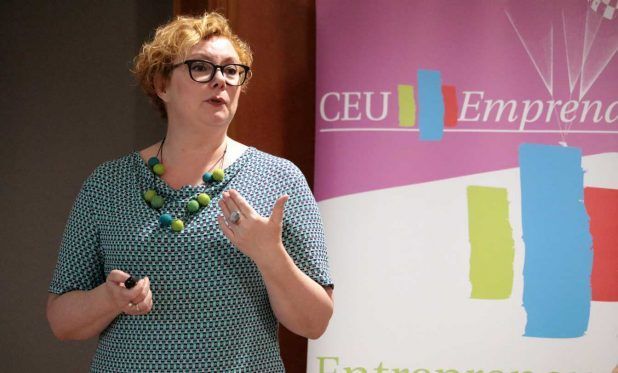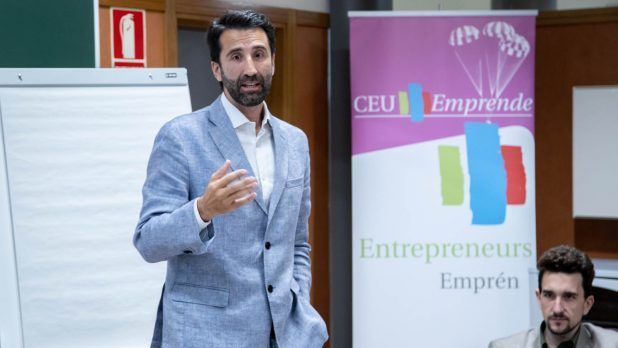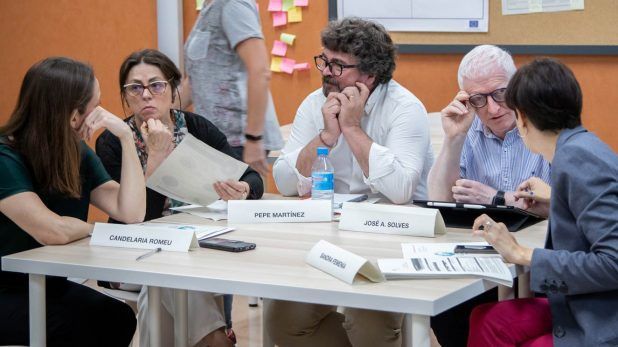Connecting students and academic staff from Universities across the globe, transforming coursework and fostering intercultural competences. After successful implementation in top institutions in the US and Europe, COIL arrives in CEU Valencia determined to enhance global learning and change our campus experience. An innovative project backed by the Vice Rector for Internationalization in collaboration with COIL expert Eva Haug.

The ongoing trend towards a stronger internationalization of the curriculum and of teaching and learning has landed in CEU Valencia. COIL (Collaborative Online International Learning) is a transformative educational experience born and developed in the United Stated with a huge acceptance in Latin America and an incipient introduction in Europe.
A first approximation to this new pedagogy has already been piloted by expert Eva Haug in a workshop attended by representatives from all our faculties.
The initiative has been strongly welcomed by the academic staff of our University, showing their support for the internationalization process and their campaign for a more multi-cultural and global education in CEU.
What is COIL and how can it improve international teamwork?
COIL is an innovative method of teaching and learning developed by the State University of New York that has rapidly been replicated in other institutions across the globe. It involves the inclusion of course modules in the syllabus, developed by two institutions from different countries. Using online technologies, students need to complete shared assignments and deliverables, with professors from both Universities co-teaching and managing coursework.
“COIL gives us a unique opportunity to incorporate a global dimension into the curriculum of our students”
In a COIL course the focus remains on student interaction and co-working, which can include several forms and vary in length or format. From short term assignments to semester length projects, COIL modules deliver global learning in the classroom, linking with learners from other countries in a common project but with different perspectives.

Collaborative Online International Learning has been specifically designed and implemented to develop global leadership skills in students. And to address this new imperative of our increasingly interconnected and diverse world, it provides literacy in the so-called 21st century skills and competences:
- Collaboration and Flexibility
- Creativity
- Critical Thinking
- Communication
The main goal is to inculcate these skills and make students more employable by embedding COIL in their academic program. The University, through its different faculties and schools, will work closely with a partner institution, introducing different COIL modules in the syllabus. The use of online technology will develop student exchange and interaction with the counterpart University.
A new dimension to internationalization running parallel to recruitment
In the last years, CEU Valencia has seen the number of international students studying on campus rise greatly. According to the latest data, the percentage of non-Spanish students enrolled in an undergraduate course in our institution is of +30%, adding diversity and enriching the experience of other students.
“If only 22% of the students go abroad, how can we provide international experiences to the remaining 78%?”
However the international strategy of our University is much more than simply the number of students on campus. The investment in internationalization made by CEU Valencia is significant and has always been approached from an inclusive point of view: not only do we recruit students from over 80 countries, but we are home to those students. We offer them both an enriching academic experience and also a truly international environment to live in.
In this sense Internationalization at Home takes us a step further in our international strategy. The acquisition of new competences and the application of innovative, global methodologies including teaching in different languages remain at the core of it.

The transformation COIL will bring to CEU Valencia will help us become a reference in the use of this learning methodology in Spain.
The challenges of virtual mobility
Our University is concerned about the future of higher education and is constantly working to readjust its strategy. The pace of change forces institutions across the continent to explore new partnerships, technologies and teaching models to address the challenges of the labour market.
In this rapidly changing world, Vice Rector for Internationalization Alfonso Díaz sees COIL as an opportunity to speed up the internationalization of our University: “One of the many positive features of a COIL project is that it is a very easy and natural way to bring the world to our students, meaning that they will benefit from an international experience right in their classroom. No matter their personal circumstances, no matter the language they speak, with COIL all CEU students will be able to interact with peers and teachers from around the world without having to go abroad. It is indeed a very democratic and unique opportunity to incorporate a global dimension into the curriculum of our students”.
Separately, Alfonso Díaz does not deny the difficulties the launching of this project entails: “Of course the implementation of COIL represents challenges, but we need to focus on the opportunities it provides. As a pioneering institution with an already strong experience in internationalization, CEU Valencia is determined to join this project and follow the footsteps of top Universities in the States, the UK and The Netherlands”.
COIL will be gradually introduced in all undergraduate courses at CEU Valencia to ensure the provision of the highest quality international based education experience for students.
This year, thousands of professionals in higher education will tackle the impact of virtual mobility in the EAIE Conference that will be held in Helsinki (Finland).






